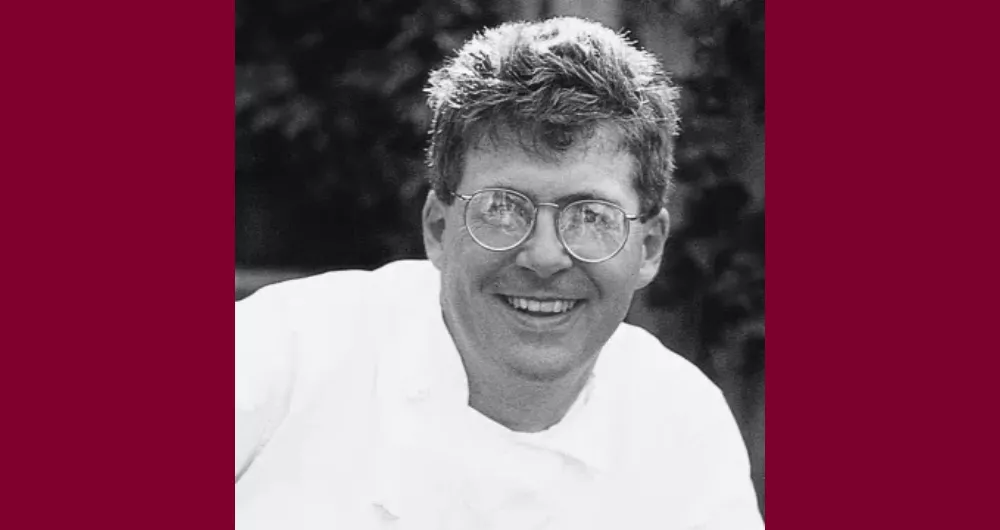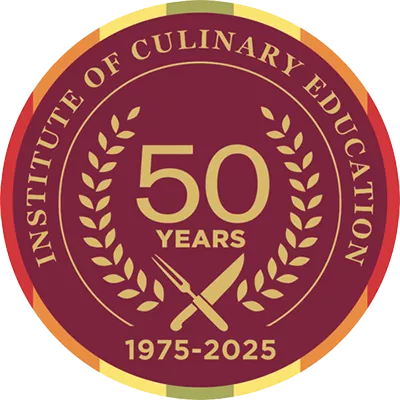To celebrate 50 years of ICE, we're honoring 50 esteemed ICE alumni. Meet James Beard Award-winning Chef Stephen Durfee.
The remarkable career of Chef Stephen Durfee is a testament to the value of hands-on learning, even if it comes with a burn or two.
A 1989 graduate of ICE — known then as Peter Kump’s New York Cooking School — Chef Stephen’s career has been a string of successes. In 1994, he was named Executive Pastry Chef at the Michelin-starred French Laundry in Yountville, California, where he went on to win the James Beard Foundation’s “Pastry Chef of the Year” award in 1998. He then worked as a pastry instructor, teaching courses in chocolate, confectionery, cakes and plated desserts for two decades. Today, he’s the Director of Curriculum at Dandelion Chocolate in San Francisco.
As for achievements, there are many. Chef Stephen represented Team USA at the prestigious Coupe du Monde de la Pâtisserie in Lyon, France, in 2013. More recently, he earned — and has maintained — the Guinness Book of World Records title for the largest S’more ever made (using 160 pounds of chocolate from Dandelion Chocolates and graham crackers that were seven feet long and weighed over 100 pounds).
Chef Stephen credits ICE with giving him the foundational skills that shaped his career and the direction that led him to his passion. A pivotal lesson on chocolate tempering at ICE sparked a lifelong interest that has defined his culinary path.
To honor ICE’s legacy and celebrate its 50th anniversary, we asked Chef Stephen about his proudest achievements, fondest culinary school memories and advice for aspiring chefs. Here’s what he had to say.
* The following interview has been condensed and edited for clarity.
ICE: You’ve had such a remarkable career. What are the milestones you’re most proud of?
Chef Stephen: I’ve been fortunate throughout my career, but a few milestones stand out. Winning the James Beard Award for Pastry Chef of the Year in 1989 was a real honor. The following year, being named one of the “Top 10 Pastry Chefs in America” by Pastry Art & Design was equally significant. Both Accolades came during my time at The French Laundry, which Ruth Reichl of The New York Times called the “most exciting place to eat in America.” It was a transformative period for me.
Later, representing Team USA at the Coupe du Monde de la Pâtisserie in 2013 was unforgettable. Standing in Lyon with the American flag on my jacket, crafting desserts and chocolate showpieces — it was a moment of real civic pride, even though we placed fourth. That experience affirmed my love for chocolate as a craft and an art form.
ICE: What does a day in your life look like at Dandelion Chocolate?
Chef Stephen: My workday revolves around educating chocolate enthusiasts at Dandelion Chocolate. I lead tastings, tours and classes where I share the story of chocolate — from how it’s made to crafting truffles and tempering. It’s a joyful job because people come eager to learn and leave with a deeper appreciation for chocolate. Every day, I get to share my passion with others and that’s incredibly rewarding.
ICE: So, how did it all start? When did you realize food would become your life’s work?
Chef Stephen: My first restaurant job was as a dishwasher at a Japanese restaurant in upstate New York. It wasn’t glamorous, but I was hooked. The energy, the controlled chaos, the artistry — it was thrilling. I moved up to prep cook and the chef even taught me how to garden and grow ingredients. That hands-on experience planted the seed for my culinary career.
Pastry came later, almost by accident. At the time, I was working as a bread baker in New York City while holding down a second job as a private chef for a family. The bread-baking job included some dessert preparation, something I wasn’t formally trained in but found intriguing. I started learning through cookbooks and hands-on practice, but wanted to deepen my skills. That’s when I discovered a weekend pastry course at ICE, then Peter Kump’s New York Cooking School. The class met on Saturday and in just five or six sessions, I was completely captivated. It wasn’t just the techniques but the precision, discipline and creativity that pastry demands. I fell head over heels for it.
That short class completely shifted my focus. It was the foundation I needed to pivot my career and embrace pastry as my passion.
ICE: What’s something you learned at ICE that still sticks with you?
Chef Stephen: There was a two-day chocolate workshop at the school that changed everything for me. We learned to temper chocolate, a fascinating and precise process and made truffles and other small chocolates. I remember one of the molds we used was in the shape of seashells, and I thought it was the coolest thing. That same week, I went straight to JB Prince and bought chocolate molds. At that time, I was working at a restaurant in New York City, so I had access to a kitchen and ingredients. I spent every spare moment practicing what I’d learned, making chocolates for the restaurant.
That two-day class planted the seed for what would eventually become my specialty. When I started competing, I chose chocolate as my focus. I didn’t know anything about ice carving or sugar sculptures, but I knew I could dive deeper into chocolate. Even now, working with chocolate is central to what I do every day, and I still think back to that workshop at ICE. It was the first step in a journey that has defined my career.
ICE: What was it about ICE that helped you build such a strong foundation?
Chef Stephen: The school gave me a solid foundation in classic techniques... the skills I learned were timeless and still serve me today.
Mentorship was another key piece of my time at ICE. My instructor, Nick Malgieri, was incredibly influential. He introduced me to chocolate-making, and his passion for the craft inspired me to pursue it as a specialty. I still think of him showing us how to temper chocolate and make truffles. He made it look effortless, but the process required such care and precision. To this day, I carry those lessons with me, and they inform the way I teach people.
ICE: If someone’s thinking about culinary school, what advice would you give them?
Chef Stephen: Culinary school is a valuable experience, but I always recommend getting some real-world experience first. Work in a kitchen, even if it’s as a dishwasher. It will give you a sense of the industry and help you get the most out of school. You’ll have a better idea of what questions to ask and where to focus your learning.
ICE: Do you have any favorite memories from your time at ICE?
Chef Stephen: One day stands out vividly. We were working with caramel and I accidentally burned my finger. My instinct was to put [my finger] in my mouth, which only resulted in burning my tongue, too! It was a small moment, but it taught me the importance of focus and precision in the kitchen.
QUICKFIRE QUESTIONS
Favorite kitchen tool? My infrared thermometer.
Salty or sweet? Salty!
Favorite food season? Fall – I love the flavors and comfort it brings.
Go-to recipe for impressing guests? Mashed potatoes. They’re simple but can be elevated into something truly extraordinary.
Favorite food city? San Francisco. I love the diversity and quality of the food scene here.







